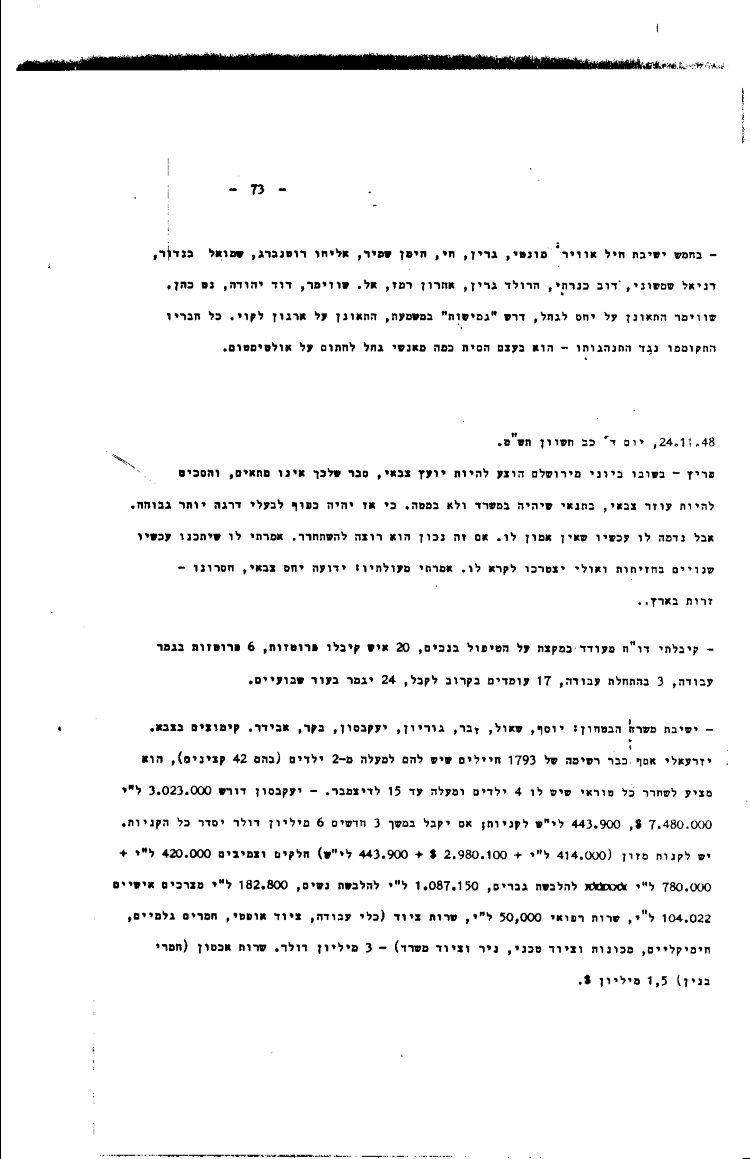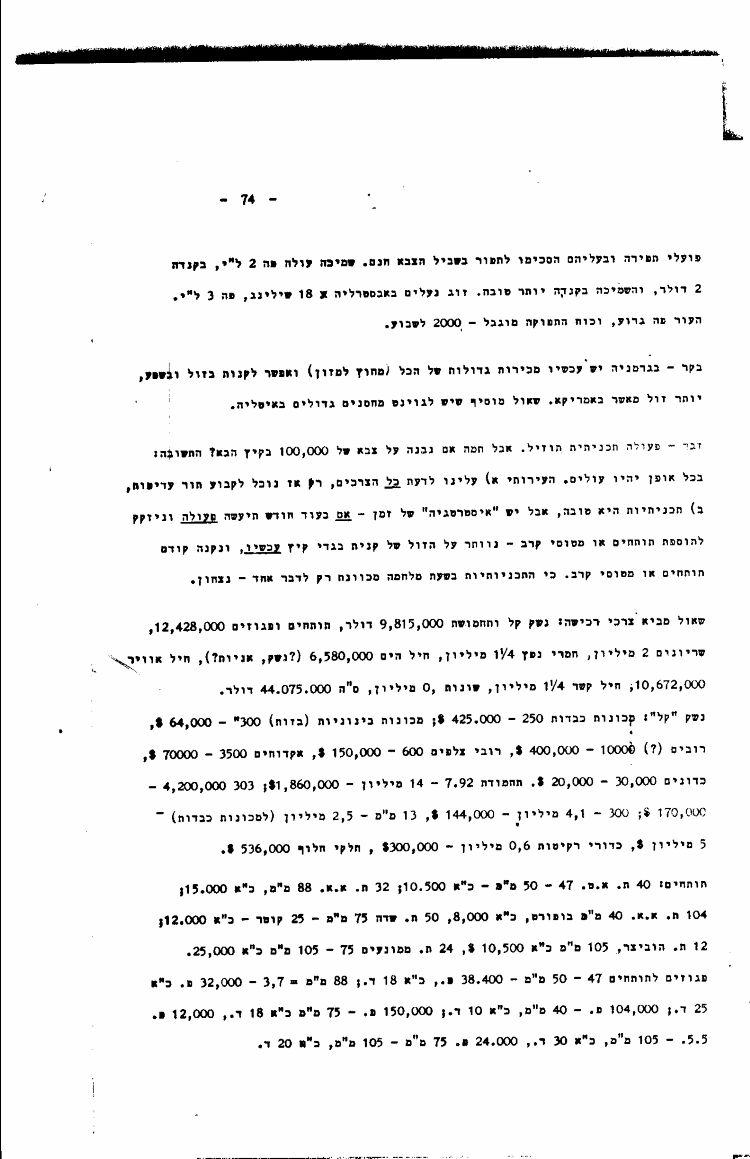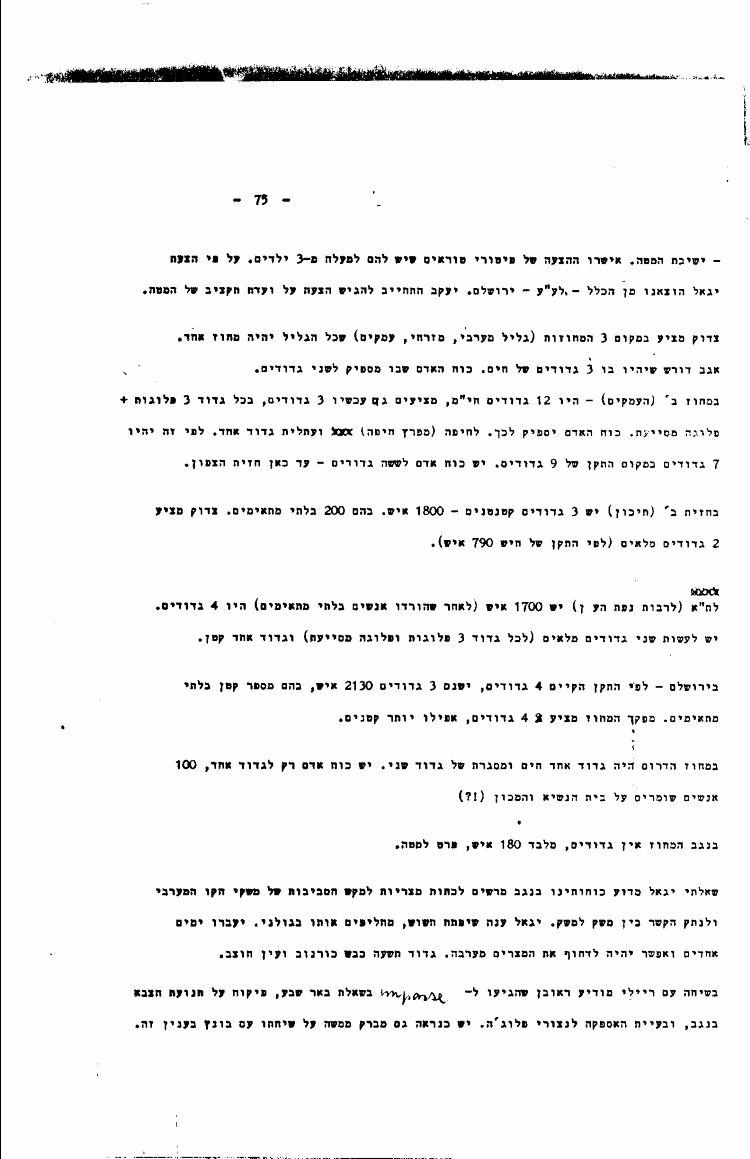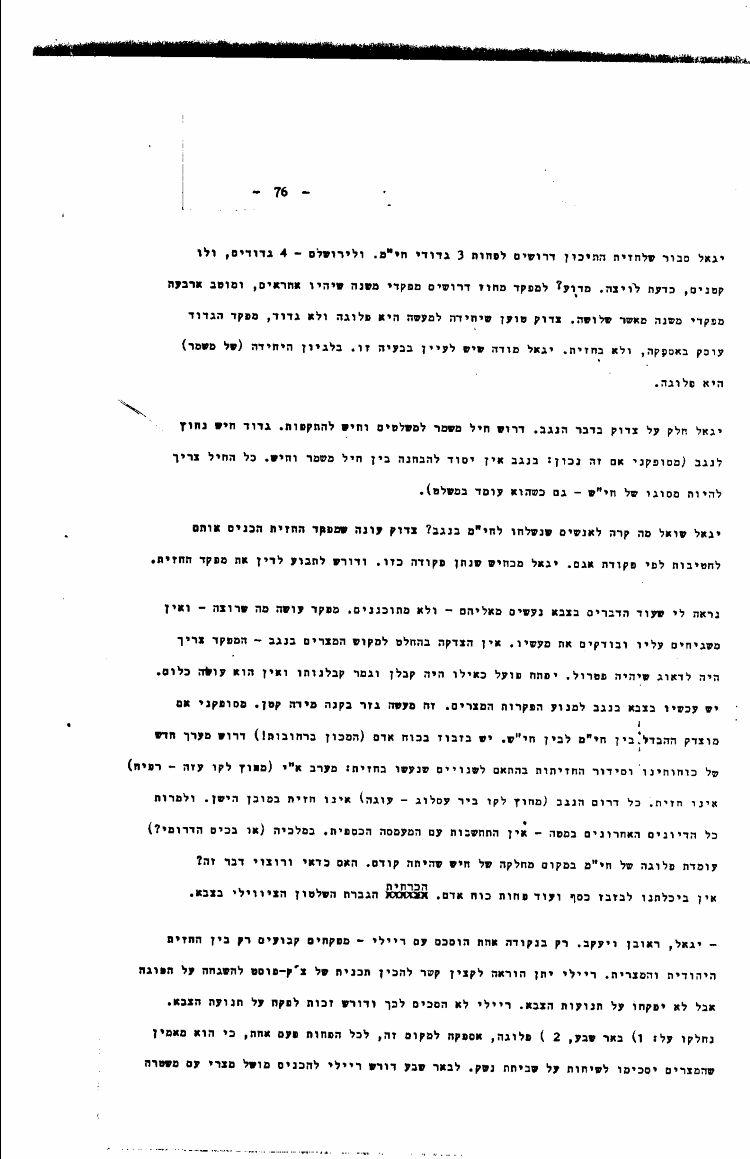1
of
Places:
United States
Nayn
Canada
Be'er Sheva
Haifa
Kadduri
H̠atseva
Yiftah̠
Atlit
Mampsis
Bir Asluj
Barak
Gezer
Gaza
Reh̠ovot
Malkiya
Jerusalem
Dan
People:
The use of the photograph is subject to the Copyright Law, 2007
24.11.1948
225141
Wednesday, November 24, 1948 Fritz [Eshet] – when he returned in June from Jerusalem he was invited to be a military advisor. He doesn’t think he’s suited to this, and agreed to be a military aide, on the condition that he be in the [Defense] Ministry rather than the Staff, because then he’ll be subordinate to men of higher ranking. But now it seems to him that he’s not trusted. If this is true, then he wants to be discharged. I told him that there might be changes at the fronts now and I may need to call on him. I named his strengths: military knowledge and instinct; weakness – foreignness in the country. I received a slightly encouraging report on care for the disabled. 20 people received prosthetics, work is being completed on 6 prosthetics, work is starting on 3, 17 [people] will soon receive [prosthetics], 24 will be finished in two weeks. – Defense Ministry meeting: [Yosef] Yizraeli, Shaul [Avigur], Zabar [Avraham Zabrasky], [Yosef] Gurion, [Yosef] Yaakovson, [Aharon] Becker, [Yosef] Avidar, on reductions in the army. Yizraeli has already compiled a list of 1,793 soldiers who have more than 2 children (42 officers among them). He proposes discharging every private who has 4 or more children by December 5. Yaakovson is requesting P£ 3,023,000, $ 7,480,000, £ 443,900 for purchases; if he receives $6 million over the course of 3 months, he’ll arrange all the purchases. [We] need to buy food (P£ 414,000 + $ 2,980,100 + £ 443,900); parts and tires P£ 420,000 + P£ 780,000; for men’s clothing P£ 1,087,150; for women’s clothing P£ 182,800; personal supplies P£ 104,022; medical care P£ 50,000; equipment services (work tools, optical equipment, raw materials, chemicals, machines and technical equipment, paper and office equipment) – $ 3 million. Storage service (building materials) $ 1.5 million. Sewing machine operators and [sewing workshop] owners agreed to provide sewing for the army for free. A blanket costs P£ 2 here, $ 2 in Canada, and the blanket in Canada is better. A pair of shoes is 18 shillings in Australia, P£ 3 here. The leather here is terrible, and the production capacity is limited – 2,000 per week. Becker – in Germany there are large sales of everything now (except for food), and it’s possible to buy a lot cheaply, more cheaply than in America. Shaul adds that the Joint [Distribution Committee] also has large warehouses in Italy. Zabar – planning will reduce costs. But he wonders if we’re counting on an army of 100,000 next summer. The answer: in any event there will be immigrants. I commented: A) We have to know all the needs, only then can we set priorities, B) Planning is good, but there is a “strategy” of time – if in a month an operation is conducted, and we need additional cannons or fighter planes, then we’ll pass up the chance to buy cheap summer clothes now, and will buy cannons or fighter planes first, because planning in wartime is directed at only one thing – victory. Shaul presents the procurement needs: light weapons and ammunition $9,815,000, cannons and shells 12,428,000, armors 2 million, explosives 1¼ million, Navy 6,580,000 (?weapons, ships?), Air Force 10,672,000, signal corps 1¼ million, miscellaneous, 0 million, total $44,075,000 . “Light” weapons: heavy machine [gun]s 250 – $425,000; mid-sized machine [gun]s (Besa) 300”: – $64,000, rifles (?) 10,000 – $400,000, sniper rifles 600 – $150,000, pistols 3,500 – $70,000, bayonets 30,000 – $20,000. Ammunition [?] 7.92 – 14 million – $1,860,000; 303 [–] 4,200,000 – $170,000; 300 – 4.1 million – $144,000, 13 mm – 2.5 million (for heavy machine [gun]s) – $ 5 million, rocket rounds 0.6 million – $300,000, spare parts $536,000. Cannons: 40 A.T. [anti-tank] C. [cannons] 47 – 50 mm – 10,500 each; 32 A.A. [anti-air] C. 88 mm, 15,000 each; 104 A.A. C. 40 mm Bofort , 8,000 each, 50 field C. 75 mm – 25 caliber – 12,000 each; 12 Howitzer C, 105 mm each, $10,500, 24 motorized C. 75 – 105 mm each 25,000. Shells for cannons 47 – 50 mm – 38,400 S. [shells], $18 each; 88 mm – 3.7 – 32,000 S. $25 each; 104,000 S. – 40 mm, $10 each; 150,000 S. – 75 mm $18 each, 12,000 S. 5.5 – 105 mm, $30 each, 24,000 S. 75 mm – 105 mm, $20 each. – [General] Staff meeting. They approved the proposal to dismiss privates with more than 3 children. Per Yigael [Yadin]’s proposal we excluded Jerusalem – for now. Ya’akov [Dori] promised to submit a proposal on the Staff’s budgetary committee. [In a discussion on dividing the country into districts, and allocating garrison forces, Moshe] Zadok proposes that instead of the 3 districts [in the north] (Western Galilee, Eastern [Galilee], valleys), the entire Galilee be one district. The Operations Department demands that it [the Galilee] have 3 garrison battalions. The manpower there is enough for two battalions. In District B (the valleys) there were 3 garrison battalions, now they’re also proposing 3 battalions, in each battalion 2 companies + an auxiliary company. There’s enough manpower for this. For Haifa (Haifa Bay) and ‘Atlit one battalion. Accordingly there would be 7 battalions instead of the standard of 9 battalions. There’s [enough] manpower for six battalions. That’s it for the Northern Front. In Front B (Tichon [“Central”] [Eastern]) there are 3 tiny battalions – [in total] 1,800 men, of whom 200 are unsuitable. Zadok proposes 2 full battalions (under the Hayish standard, 780 men). For Tel Aviv (including the ‘Ayin subdistrict [Gush Dan]) there are 1,700 men (after subtracting the unsuitable ones). There were 4 battalions. Need to form two complete battalions (for each battalion 3 companies and an auxiliary company) and one small battalion. In Jerusalem – under the existing standard 4 battalions; there are 3 battalions, 2,130 men, of whom a small number are unsuitable. The district commander proposes 4 battalions, even smaller. In the Southern District there was one garrison battalion and the framework of a second battalion. There’s only enough manpower for one battalion, 100 men are guarding the president’s residence and the Institute [Sieff Institute, near Weizmann’s house in Rehovot]. In the Negev District there are no battalions, aside from 180 men, except for the staff. I asked Yigael [Yadin] why our forces in the Negev are allowing the Egyptian forces to lay mines around the settlements on the western line and to cut off communication between each of the settlements. Yigael replied that Yiftah is exhausted, and is being replaced with Golani. In a few days it will be possible to push the Egyptians westward. Battalion Nine [of the Negev Brigade] has captured Kurnub [Mamshit] and ‘Ein Husub [Hatzeva]. In a conversation with Riley, Reuven [Shiloah] reports, they reached an impasse regarding Beersheva, oversight over army movement in the Negev, and the problem of supplies for those besieged in Faluja. Apparently there’s also a cable from Moshe [Sharett] regarding his conversation with Bunche on this matter. Yigael believes that the Tichon [Central] Front needs at least 3 garrison battalions, and Jerusalem – 4 battalions, even small ones, according to Levitze [Yitzhak Levi, district commander]. Why? The district commander requires deputy commanders who will be responsible, and better to have four deputy commanders than three. Zadok argues that a unit is actually a company and not a battalion. The battalion commander works on supplies, and not at the front. Yigael acknowledges that this problem needs to be examined. In the [Arab] Legion the (guard) unit is a [military] company. Yigael disagrees with Zadok regarding the Negev. [We] need a garrison force for the strongholds and Hayish [field corps] for attacks. A Hayish battalion is needed for the Negev (I’m not sure this is right: in the Negev there is no basis for distinguishing between a garrison force and Hayish. Every soldier needs to be a Hayish type – even when he’s stationed at a stronghold). Yigael asks what happened to the men who were sent for garrison in the Negev. Zadok replies that the front commander placed them in brigades under orders of the Operations Department. Yigael denies that he issued such an order, and demands that the front commander be court-martialed. It seems to me that things in the army still happen on their own – rather than being planned. A commander does whatever he wants – and no one supervises him or examines his actions; there’s certainly no justification for the Egyptians’ mine-laying in the Negev. The commander should’ve ensured that there would be patrols. Yiftah is acting as if he were a contractor and finished his contracting work, and has nothing to do. There are enough forces in the Negev now to prevent Egyptian unruliness. It’s the Gezer incident [the fall of Kibbutz Gezer in June, despite the nearby presence of forces] on a small scale. I doubt whether the distinction between garrison and Hayish is justified. There’s a waste of manpower (the Institute in Rehovot). [We] need a rearrangement of our forces and organization of the fronts according to the changes that took place at the front: western Eretz Israel (aside from the Gaza – Rafiah line) is not a front. All of the southern Negev (aside from the Bir ‘Isluj – ‘Auja line) is not a front in the old sense. And despite all the recent discussions at the [General] Staff – no consideration is given to the financial burden. In Malkiyya (or the southern “pocket”?) there’s a garrison company instead of the Hayish platoon that was there earlier. Is this advisable and desirable? We cannot waste money and even less – manpower. It’s imperative to increase civilian rule in the army. – Yigael [Yadin], Reuven [Shiloah], and Ya’akov [Dori]. Only on one point was there agreement with Riley – permanent [UN] observers only between the Jewish and Egyptian fronts. Riley will give instructions to a liaison officer to prepare a plan for a check-post to supervise the truce, but they won’t oversee military movements. Riley didn’t agree to this and demands the right to oversee all military movement. They disagreed on: 1) Beersheva, 2) Faluja, a supply [convoy] to the site, at least once, because he believes that the Egyptians will agree to armistice talks. For Beersheva Riley demands inserting an Egyptian governor with his own police (?). For Faluja he requests 2-3 trucks of food (for five days) as a one-time act, 3) oversight over our army’s movement – if movement is necessary we’ll request a permit from him, and he’ll grant it. – Government meeting.













